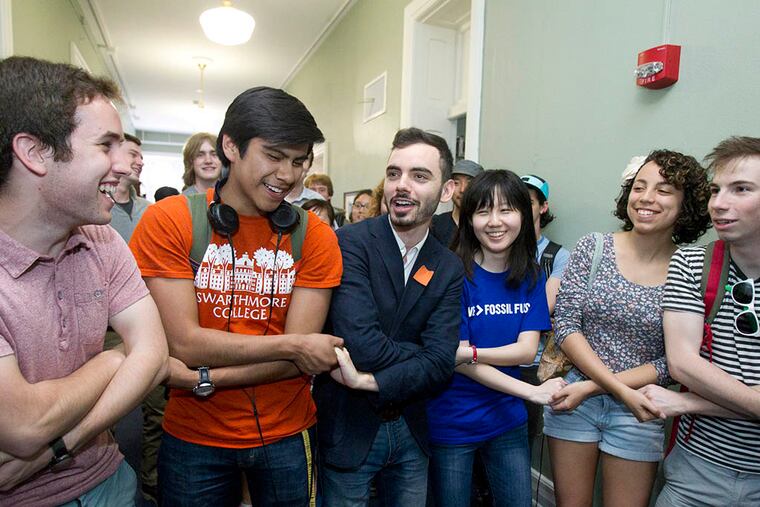Swarthmore sit-in ends with fossil-fuel divestment support
A 32-day student sit-in at Swarthmore College ended Monday after faculty voted to support the protesters' demands to divest endowment money out of fossil fuels.

A 32-day student sit-in at Swarthmore College ended Monday after faculty voted to support the protesters' demands to divest endowment money out of fossil fuels.
"We are ending after a commitment by the Board of Managers to engage us in the weeks leading up to their decision on divestment on May 1 and 2," said sophomore Stephen O'Hanlon, an organizer with Swarthmore Mountain Justice, the student group that has pushed for divestment for the last five years. An alumni petition with 1,100 signatures bolstered their demands.
"Swatties," as Swarthmore students are called, are asking the school's trustees - known in the college's Quaker tradition as the Board of Managers - to partially divest the $1.9 billion endowment of oil, gas, coal, and other fossil fuel-related companies in a way that would avoid losses in the portfolio.
Over 100 students, such as O'Hanlon and freshman Sophia Zaia, began the sit-in on March 19, sleeping in Parrish Hall and working in shifts.
"So many people worry that there's nothing one person can do about climate change. I recycle, I dry-line my clothing, but I still felt disempowered," Zaia said.
"Big institutional change needs to happen, like our divestment from fossil fuels," she added.
Swarthmore was the birthplace five years ago of the national divestment movement. But the college was slow to consider the possibility at the trustee level.
Between $200 million and $300 million of Swarthmore's $1.9 billion endowment is invested in separately managed accounts that can be gradually divested, said Giles Kemp, a 1972 alumnus who chairs the board. Those accounts would be the first to divest under the student proposal.
Since Swarthmore birthed the movement, students at other schools such as Yale and Harvard Universities, and Bryn Mawr and Haverford Colleges, plus state schools like the University of Colorado, have begun divestment campaigns as well.
Syracuse University recently divested from fossil fuels completely; Stanford University, from coal companies last year. And the Rockefeller Brothers Fund, heir to John D. Rockefeller's Standard Oil fortune, last fall said it would no longer invest its $860 million in fossil fuels, the source of the family's wealth.
Neither Harvard nor Yale has divested and students have been arrested at both schools. By contrast, Swarthmore's sit-in has been amicable.
A total of 175 students slept and studied in the hallways over a month, with a cooler of donated drinks and cookies nearby. Administrators stepped adroitly around students' plugged-in cellphones and backpacks full of books and clothes.
"It's very much a struggle within a family. Swarthmore has a Quaker heritage. It takes social responsibility and ethical intelligence very seriously. Students are living out their education by taking over the building," said religion professor Mark Wallace.
Swarthmore's campaign drew a visit from the environmental activist Bill McKibben, who visited the student sit-in on April 8.
McKibben, cofounder of 350.org, wrote an early book on global warming and lends his name to various climate change and divestment protests.
Protests have also begun at Haverford. Students are calling on their board of managers to freeze any new investment in fossil-fuel companies, and to divest within five years from direct ownership and from any commingled funds that include fossil-fuel public equities and corporate bonds.
At Swarthmore, supportive alumni include Avery Rome, a former member of the college's board.
"It reminds me of the student push to get us out of apartheid-linked companies in South Africa" in the 1980s, she said. "That's not to say the top deans and Board of Managers aren't aware. But typically, the big emotional response comes from young people. That pushes the adults over to their side."
"I'm glad the students are pushing the college. This kind of roiling is typical of the place and good for it as an institution," Rome added.
Should the board vote down partial divestment, the students will restart the campaign in September, once classes start again.
"We teach the students to be agents of social change. If Swarthmore would divest, it would be the first college in Pennsylvania to do so," Wallace added.
"If the board does nothing, we'd be prepared to escalate in the fall," O'Hanlon said.
215-854-2808